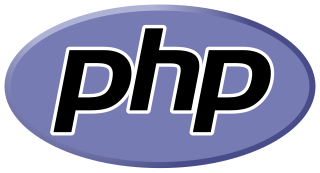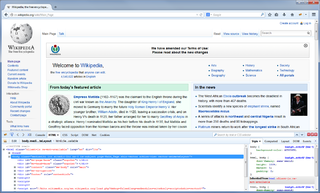
PHP is a general-purpose scripting language geared toward web development. It was originally created by Danish-Canadian programmer Rasmus Lerdorf in 1993 and released in 1995. The PHP reference implementation is now produced by The PHP Group. PHP was originally an abbreviation of Personal Home Page, but it now stands for the recursive initialism PHP: Hypertext Preprocessor.

An embedded system is a computer system—a combination of a computer processor, computer memory, and input/output peripheral devices—that has a dedicated function within a larger mechanical or electronic system. It is embedded as part of a complete device often including electrical or electronic hardware and mechanical parts. Because an embedded system typically controls physical operations of the machine that it is embedded within, it often has real-time computing constraints. Embedded systems control many devices in common use today. In 2009, it was estimated that ninety-eight percent of all microprocessors manufactured were used in embedded systems.

NetBeans is an integrated development environment (IDE) for Java. NetBeans allows applications to be developed from a set of modular software components called modules. NetBeans runs on Windows, macOS, Linux and Solaris. In addition to Java development, it has extensions for other languages like PHP, C, C++, HTML5, and JavaScript. Applications based on NetBeans, including the NetBeans IDE, can be extended by third party developers.

A kernel panic is a safety measure taken by an operating system's kernel upon detecting an internal fatal error in which either it is unable to safely recover or continuing to run the system would have a higher risk of major data loss. The term is largely specific to Unix and Unix-like systems. The equivalent on Microsoft Windows operating systems is a stop error, often called a "blue screen of death".

Zend, formerly Zend Technologies, is a Minneapolis, Minnesota-based software company. The company's products, which include Zend Studio, assist software developers with developing, deploying, and managing PHP-based web applications.
The PHP Extension and Application Repository, or PEAR, is a repository of PHP software code. Stig S. Bakken founded the PEAR project in 1999 to promote the re-use of code that performs common functions. The project seeks to provide a structured library of code, maintain a system for distributing code and for managing code packages, and promote a standard coding style. Though community-driven, the PEAR project has a PEAR Group which serves as the governing body and takes care of administrative tasks. Each PEAR code package comprises an independent project under the PEAR umbrella. It has its own development team, versioning-control and documentation.
Zend Studio is a commercial, proprietary integrated development environment (IDE) for PHP developed by Zend Technologies, based on the PHP Development Tools (PDT) plugin for the Eclipse platform.

LAMP is an acronym denoting one of the most common software stacks for many of the web's most popular applications. However, LAMP now refers to a generic software stack model and its components are largely interchangeable.
Laminas Project is an open source, object-oriented web application framework implemented in PHP 7 and licensed under the New BSD License. The framework is basically a collection of professional PHP-based packages. The framework uses various packages by the use of Composer as part of its package dependency managers; some of them are PHPUnit for testing all packages, Travis CI for continuous Integration Services. Laminas provides to users a support of the model–view–controller (MVC) in combination with Front Controller solution. MVC implementation in Laminas has five main areas. The router and dispatcher functions to decide which controller to run based on data from URL, and controller functions in combination with the model and view to develop and create the final web page.
Dynamic program analysis is analysis of computer software that involves executing the program in question. Dynamic program analysis includes familiar techniques from software engineering such as unit testing, debugging, and measuring code coverage, but also includes lesser-known techniques like program slicing and invariant inference. Dynamic program analysis is widely applied in security in the form of runtime memory error detection, fuzzing, dynamic symbolic execution, and taint tracking.

Aptana, Inc. is a company that makes web application development tools for use with a variety of programming languages. Aptana's main products include Aptana Studio, Aptana Cloud and Aptana Jaxer.
Cervisia is a graphical front end for Concurrent Versions System (CVS).

PHP Development Tools (PDT) is a language IDE plugin for the Eclipse platform and the open-source project that develops it.

Firebug is a discontinued free and open-source web browser extension for Mozilla Firefox that facilitated the live debugging, editing, and monitoring of any website's CSS, HTML, DOM, XHR, and JavaScript.
Zend Server is a complete and certified PHP distribution stack originally developed by Zend Technologies intended for high performance and scalable use cases.











